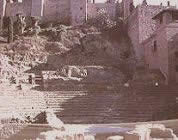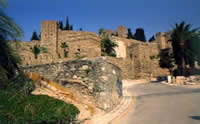The History of Malaga
The First Settlements
The strategic position to the Mediterranean Sea has always made Malaga an attractive zone for foreign invasions. The first settlement in Malaga was made by the Phoenicians who founded the city more the 3000 years ago. The town, at the time called Malaka, was used as a commercial center for the region and exploited for its richness in metals such as silver and copper.
The Phoenician period lasted until about 550 b.c where Malaga was conquered by the Carthaginians who took the control over all the commerce in the area. The Carthaginian dominants ended in 218 b.c when the Romans entered Malaga and other parts of Spain.
 The Roman Period
The Roman Period With the Roman victory Malaga formed part of Hispania Ulterior (ulterior Spain) of the Roman Empire. This was the beginning to an import period in the history of Malaga. The Romans created an economical and cultural center in Malaga and significant constructions such as the port of Malaga and the roman theatre (see photo) were constructed.
Under the Emperor Tito Malaga was as well named a confederate city of Rome, which was an increase in the importance of the town in Roman Empire.
In the beginning of the 4th century, hundred years after the Roman entrance, Malaga appeared as one of the regions in Spain who had adapted best to the Roman life style and was one of the only regions where the Christianity had made its strong entrance with the population.
When the Roman Empire started to fall in the beginning of the 5th century the coast of Andalusia including Malaga was regularly invaded by small Visigoths tribes. The Visigoths finally conquered the entire town of Malaga in 623, where after the last Romans tropes leaved the town.
Moorish Epoch
The Visigoth dominants in Malaga only lasted until 711 when the Moors invaded the Iberian Peninsula from the South. This was the beginning of another long and interesting part of the Malaganean history.
The first 30 years after the invasion the Moors concentrated on defending and expanding their territories. It was first in 743 under Abd Al Ariz when the Moors began to expand the town on the existing Roman and Visigoth structure. This was a period with important constructions, like the town wall and the 5 great gates and as well where the town experienced an increase in cultural and commercial activities.
In the 11th century rivalry began between different noble Moorish families in Andalusia. Malaga was in this period ruled by the kingdoms Taifas and not until 1.143 when Ibn Hud took over the power Malaga got its own sovereign.
After the dead of Ibn Hud Malaga falls under the Kingdom of Granada at the time ruled by Muhamad I.

Malaga stayed under the different Moorish Caliphs in Granada, who were responsible for the construction of the two most important monuments in Malaga, the fortress Alcazaba (see photo), which was started in the 11th century and the castles/ fortress Gibralfaro, which was not finished until the beginning of the 15th century.
The Christian Period
In the 14th century the first Christian attends to defeat the Moorish sovereign took place. It was not until 100 years later in August in 1487 when the Christians finally defeated the Moors in Malaga, with an important help from small Christian clans within the town.
After this Malaga started to change its appearance from a Muslim to a Christian town and many of the Muslim families participating in the defense of the town were killed, exposed or sold as slaves. The destruction of Moorish monuments and the construction of churches and other Christian compliments was part of the transaction from Muslim to Christian town. But not all Moorish constructions were destroyed. An example is the Alcazaba and Gibralfaro, which the Christians used, like the Moors, to defend the town from foreign attacks. In 1528 Diego de Vergara began the construction of the cathedral of Malaga, which was finished by his son in 1598.
The 17th-18th centuries were bad years for the town. Although the population grew in numbers, the town was hit by several epidemics, earthquakes and important inundations, which ruined several constructions like the expansion of the harbor.
In the 19th century the town grew faster and the town walls build by the Moors were demolished to give place for the amplification of the town. Napoleon also made his entrance in the town, but the French domination only lasted two years from 1810 to 1812. In this century Malaga also started to be a popular destination for rich people to spend their free time, which was the beginning to the tourist industry in the area. Important constructions such as the theatre Cervantes (1866), calle Marqus de Larios y la Alameda (1891) were also from this period. The century finished with economic crisis, new plagues and inundations.
20th Century and Today
In the beginning of the 20th century the economic crisis still had its hold all over Spain and especially in Malaga, where the population suffered problems in the agricultural sector due to several natural disasters. This period was also dominated by the political instability throughout the whole country, which culminated with the Spanish civil war from 1936-39. After the civil war, during the dictatorship of General Franco, the economy in Malaga slowly recovered.
It was not until the 60's tourist boom, when the economy in Malaga recovered totally. In this decade hotels and tourist resorts were build all over Malaga and Costa del Sol, which still today is one of the most popular destinations with more than 6 million tourists visiting the region every year.
Apart from the tourist industry Malaga is also today a cosmopolitan city with Spain's second largest port and third largest international airport. It is also known as the business and cultural center for the southern part of Spain and every year there are celebrated more than 100 international conventions in the region.